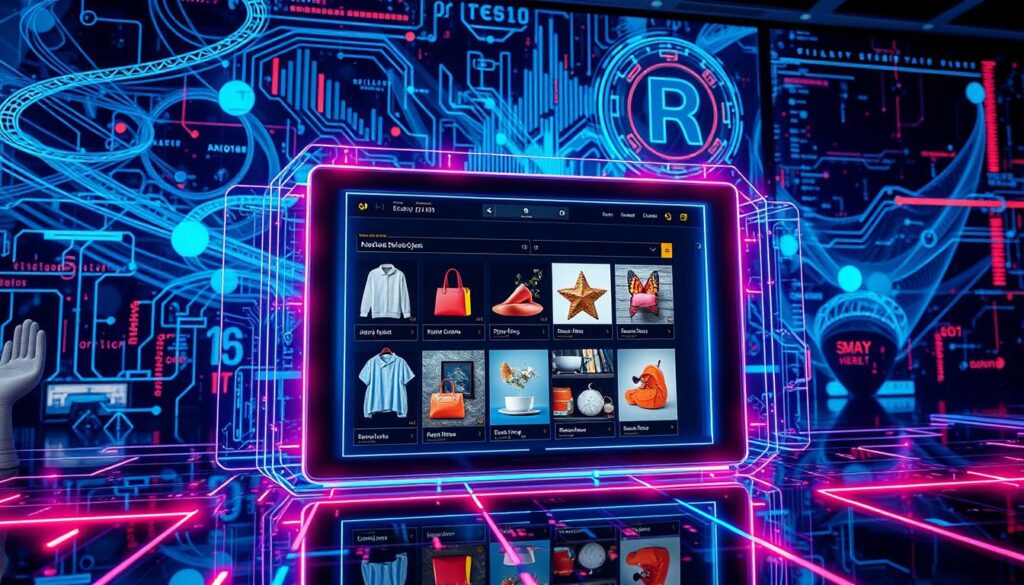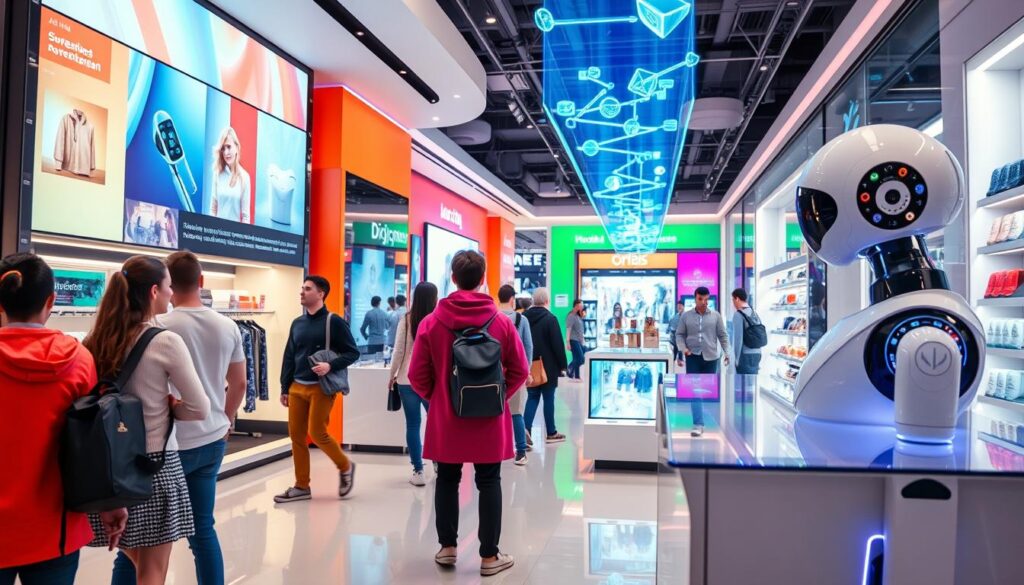AI is changing how we shop in big ways. It makes shopping better by personalizing what we see. This means using smart algorithms to figure out what shoppers like. Then, it suggests products that match their tastes perfectly. This smart approach helps shoppers and stores alike.
AI tools are being used more in stores today. They make shopping smoother and keep shoppers interested. Plus, they make the whole shopping vibe better. AI helps by suggesting products that look good and are relevant. This way, customers enjoy their shopping more and want to keep coming back.
Key Takeaways
- AI in retail leverages cutting-edge technology to enhance user experience and satisfaction.
- Advanced algorithms analyze user preferences and behaviors for tailored product suggestions.
- AI-powered visual recommendations streamline the shopping process.
- Retailers can engage customers more effectively with personalized product options.
- AI technology in shopping fosters a positive shopping environment and increased customer retention.
The Role of AI in Modern Retail
AI technology has transformed how we shop online. It makes shopping easier and more personal. AI learns what customers like. Then, it helps stores stock up wisely. It also suggests products that fit our tastes. This makes shopping faster and more personal. Retailers can now understand what we want better. They know what we might like in the future.
AI Integration in Ecommerce Platforms
AI makes online shopping platforms work better. It uses data to improve everything from managing stock to creating ads that speak to us directly. Here are some ways AI helps:
- Personalized Shopping Experiences: AI figures out what each customer likes. This makes shopping feel special for everyone.
- Efficient Inventory Management: AI predicts what will sell. This keeps shelves stocked just right.
- Dynamic Pricing Strategies: AI changes prices based on what’s happening in the market. This ensures prices are always fair.
Changing Consumer Behavior with AI
AI is changing the way we feel about shopping. It looks at what we buy and do. Then, it helps stores meet our changing needs. Here’s what it does for us:
- Predictive Shopping Trends: AI spots what’s becoming popular. It gets us the goods we’re starting to want.
- Improved Customer Service: AI chatbots help us quickly. They make us happy and loyal shoppers.
- Enhanced User Interactions: AI makes shopping online feel unique for each of us. This gets us to buy more.
| Feature | Impact on Retail |
|---|---|
| Personalized Recommendations | Increases customer satisfaction and sales |
| Predictive Analytics | Improves inventory management and operational efficiency |
| Dynamic Pricing | Optimizes pricing strategies for higher profitability |
| Chatbots and Virtual Assistants | Enhances customer service and support experiences |
Understanding Visual Recommendation Systems
Visual recommendation engines are key in today’s retail world. They use AI analytics and machine learning to boost user experiences and increase sales. By studying visual data from user interactions, they offer personalized product suggestions. Let’s look into how these systems work and the technology behind them.
How Visual Recommendations Work
Visual recommendation engines use advanced machine learning in retail settings. They identify patterns, colors, and styles in product images. This lets them predict and recommend products that match a user’s tastes. By looking at the visual elements of images users interact with, these engines give tailored recommendations. This improves user engagement.

The Technology Behind AI Visual Analysis
The main technology behind AI visual analysis in these engines is deep learning and neural networks. These tools help interpret and process images in detail, making recommendations more precise. Deep learning models use big datasets to learn, getting better over time. This makes suggestions more accurate. This tech is vital in retail, helping businesses know consumer preferences better and making smarter product placements.
Benefits of AI Visual Product Recommendations
AI visual product recommendations bring big benefits for online businesses. They boost user engagement, increase satisfaction, and improve sales. It’s a game-changer in today’s digital marketplace.
Increased User Engagement
Consumer engagement strategies get a big lift from AI visual product recommendations. They show users ads and products they actually like. This makes users more interested in the site.
When users see things that catch their eye, they stick around longer. They interact more with the products shown. This is great for businesses.
Personalization and Consumer Satisfaction
Personal touches in shopping make customers happy. AI helps businesses offer exactly what users are looking for. This customization makes shoppers feel special and boosts their satisfaction.
Happy customers often come back, leading to loyalty and more sales. It’s all about making the shopping experience personal.
Boost in Sales and Conversion Rates
Sales conversion optimization gets a boost from AI visual product recommendations. They help match products to what customers want. This reduces the gap between what’s offered and what’s wanted.
By tailoring recommendations, businesses make it easier for customers to buy. This drives better purchase decisions and increases sales. It’s a win-win for everyone involved.
| Benefit | Description | Impact |
|---|---|---|
| Increased User Engagement | Targeted advertisements and product suggestions that resonate with user preferences. | Extended browsing times and higher interaction rates. |
| Personalization | Products tailored to meet individual consumer needs. | Enhanced consumer satisfaction and loyalty. |
| Boost in Sales | Recommendations that align closely with consumer desires. | Higher conversion rates and improved sales metrics. |
Implementing AI Visual Recommendations in Your Business
To successfully implement AI, companies must choose suitable tools and blend new tech with current systems. They must also stick to best practices for a smooth process. This ensures AI solutions are valuable with little trouble.
Choosing the Right Tools and Platforms
Choosing AI technologies for visual suggestions means picking tools that match your business and customer service aims. Options like Microsoft Azure, IBM Watson, and Google Cloud AI are popular. Think about how easy they are to integrate, if they can grow with your needs, and the support they offer.
Integrating AI with Existing Systems
Adding AI to current systems needs careful planning. You must check your systems, get ready for data transfer, and ensure strong IT support. Solutions from Salesforce and Oracle help make this smoother, boosting efficiency and productivity.
| Step | Description |
|---|---|
| 1. System Audit | Evaluate current systems and identify potential compatibility issues. |
| 2. Data Migration | Prepare and transfer existing data to the new AI-powered platform. |
| 3. IT Infrastructure | Set up a robust infrastructure to support new AI technologies. |
Best Practices for Seamless Implementation
For AI visual suggestions to work well, adopting best practices for seamless implementation is key. This means testing a lot, updating based on feedback, and working with experienced tech providers. Using AI consultants can give custom help and make things smoother.
Implementing AI visual recommendations well involves picking the right tools, careful integration, and following the best steps. By doing these, companies can better their operations, connect more with customers, and keep up in the fast-changing market.
Challenges of AI Visual Product Recommendations
Implementing AI for product suggestions comes with hurdles. One major challenge is keeping user data safe and private. Since these systems collect and study lots of user info, it’s crucial to protect this data. Businesses need strong security measures and to follow ethical and legal rules. This tackles AI ethics and keeps user data secure in AI systems.
Data Privacy and Security Concerns
AI suggestions work with lots of user data, raising privacy and security issues. People want to know how their info is used, so being open is key. Companies should use strong data safeguards and check their systems for weak spots. Following privacy laws like GDPR and CCPA helps build trust and meets AI ethics standards.
Technical Challenges and Solutions
Adding AI suggestions to websites can be technically tricky. Companies need to ensure these AI tools work well with their online stores and keep the AI smart and relevant. Using cloud AI services, advanced learning models, and regular updates helps solve these issues. This improves system integration and keeps the AI performing well.
User Adoption and Trust Issues
To get people to use AI suggestions, companies must be clear about the perks and data handling. Sharing how it makes shopping better can build trust. Letting users manage their data and following privacy laws also helps. This encourages people to accept and trust AI recommendations more easily.
FAQ
How does AI technology enhance the user experience in retail?
What role does AI play in modern retail?
How do visual recommendation systems work?
What are the benefits of AI visual product recommendations for businesses?
How can businesses implement AI visual recommendations?
What are some challenges associated with AI visual product recommendations?
Source Links
- https://search-careers.gm.com/en/jobs/jr-202423230/quality-torque-and-compliance-lead/
- https://search-careers.gm.com/en/jobs/jr-202423247/warehouse-supervisor/
- https://www.bigdatawire.com/this-just-in/diliko-launches-agentic-ai-platform-enhancing-data-management-for-mid-sized-enterprises/
- https://www.prnewswire.com/news-releases/global-next-generation-memory-market-forecast-to-reach-usd-4875-5-million-by-2030consumer-electronics-and-ai-to-drive-growth–valuates-reports-302299143.html
- https://www.crowdstrike.com/en-us/blog/crowdstrike-acquires-adaptive-shield-and-integrates-saas-protection/
- https://thenewstack.io/upskilling-engineering-teams-for-the-ai-era/
- https://www.mdpi.com/2075-5309/14/11/3531
- https://link.springer.com/chapter/10.1007/978-3-031-73125-9_20
- https://okmagazine.com/p/navigating-the-digital-age-essential-role-ai-detection-upholding-authenticity/
- https://www.fahimai.com/canva
- https://www.ilounge.com/articles/uncrop-review-the-leading-ai-tool-for-uncropping-images-without-losing-quality
- https://www.digitaltrends.com/computing/amazing-ai-features-for-paint-and-notepad-apps-on-windows-11/
- https://www.prnewswire.com/news-releases/survey-shows-automotive-service-technicians-want-more-data-driven-tools-302298209.html
- https://blogs.nvidia.com/blog/ai-summit-japan/



